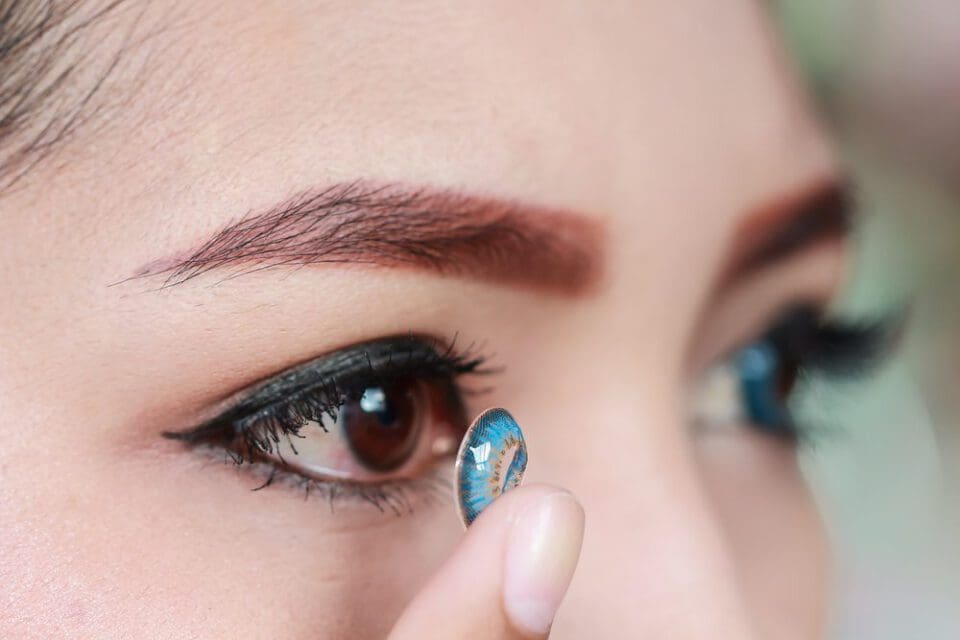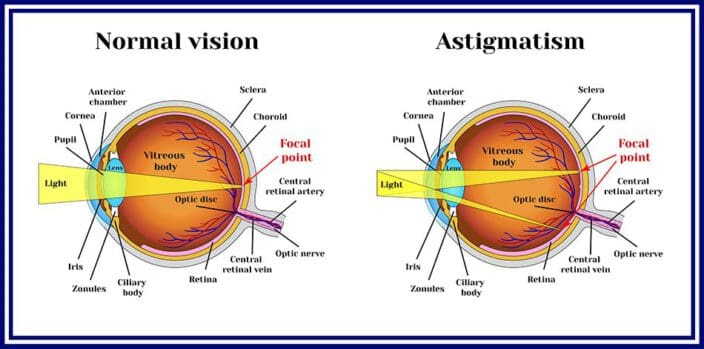Further Reading
Colored Contact Lenses for Astigmatism: Informational Guide
Home / Understanding Contacts /
Last Updated:
If you suffer from astigmatism, you can still find colored contact lenses to enhance or completely change your natural eye color.
Table of Contents
Colored contacts for astigmatism are specialized and often more expensive than traditional vision-correcting contacts.
There are several brands that make contacts for both cosmetic and vision-correcting purposes.

Contacts for astigmatism are often specialized in the form of toric lenses. These lenses change the way light is refracted into the lens of the eye to account for the irregularly shaped cornea and therefore correct vision.
Colored contacts for astigmatism work the same way as other toric lenses. They also cosmetically impact the look of the iris — the part of the eye responsible for color.
All contact lenses require a prescription and fitting from an optometrist.
Why Do People With Astigmatism Use Colored Contacts?

Contacts for astigmatism can be more specialized than contacts for hyperopia (farsightedness) or myopia (nearsightedness). They often will need to correct for distance vision as well.
All contacts are considered medical devices and must be approved by the FDA, even if they are not needed to correct vision.
You deserve clear vision. We can help.
With 135+ locations and over 2.5 million procedures performed, our board-certified eye surgeons deliver results you can trust. Your journey to better vision starts here.
Specialized contacts can be more expensive than traditional contacts. There are often fewer options as well. Colored contacts are even more highly specialized and can cost more than double the price of regular contacts. You can expect to pay $40 to $100 per month for colored contacts.

Popular Brands of Colored Contacts
The colored contact market is expanding. Currently, there are soft toric colored contacts available in daily disposable, weekly, and monthly varieties.
These are popular brand names of colored contacts for astigmatism:
- Air Optix Colors
- Neo Cosmo
- Desio Lens
- Clalen
- Geo Medical
How Do Colored Contacts for Astigmatism Work?
In the case of astigmatism, the cornea is misshapen. This causes blurry vision.
The cornea is the clear part of the eye. Astigmatism can create vision focus issues for the retina.
The American Optometric Association (AOA) reports that astigmatism can be treated with eye glasses, contacts, or surgical procedures. Contacts for astigmatism help to alter the way your eyes refract light to account for this irregular shape.
Contact lenses for astigmatism are generally soft toric lenses that can correct and sharpen vision.
Colored contacts have lines, dots, and shapes that cover the iris, the part of the eye that gives it its color, and they are typically clear in the middle where the pupil is. Toric colored contacts for astigmatism can correct vision while also allowing you to change the appearance of your eyes.
Does My Doctor Need to Prescribe Them?

The first step in getting any type of contact lens is to see an eye doctor and obtain a prescription. An optometrist will need to measure your eyes and fit you for contacts.
Contacts for astigmatism require highly detailed measurements. They may need to be customized depending on the degree of corneal irregularity.
Colored contacts for astigmatism will often be custom-made for you, so it may take some time to receive them. Custom contacts can be custom tinted as well. You may be able to choose from a variety of colors.
You deserve clear vision. We can help.
With 135+ locations and over 2.5 million procedures performed, our board-certified eye surgeons deliver results you can trust. Your journey to better vision starts here.
What Colors Are Available?
Generally, colored contacts come in either an enhancement tint or an opaque tint.
Enhancement tints are good for light-colored eyes. They enhance the color of your eyes, helping them to stand out and appear more vibrant. They are typically mostly transparent.
An opaque tint can actually change the color of your eyes by altering the appearance of the iris. If you have dark eyes, you will need an opaque tint of colored contacts in order to notice a difference in eye color.
Potential colors include:
- Blue
- Aqua
- Topaz
- Green
- Gray
- Hazel
- Brown
- Violet
Colored contacts can move around the eye. They may then be noticeable, making it clear that the color is not natural.
Opaque tint colored contacts have a clear center that may not be large enough when the pupil expands in different lighting environments. This can impact vision.
Are Colored Contacts Safe?
When cared for well, following all usage instructions, and prescribed by an eye doctor, colored contacts are safe. Do not buy them from costume shops that don’t require a prescription.
There is some risk involved with use of any contact lenses. Potential risks of contacts include:
- Corneal infections.
- Conjunctivitis (pink eye).
- Ulcerations and scratches on the cornea.
- Vision impairment.
- Blindness.
How to Care for Colored Contacts
All risks can be minimized by following all your eye doctor’s directives and the manufacturer’s instructions.
Wear your contacts exactly as instructed, and replace them on the intended replacement schedule. Use proper hygiene when handling your contacts, and wash and store them as directed.
Your eye doctor can fit you for colored contacts for astigmatism and write you a prescription for the lenses. Only use a retailer that is FDA-approved. Color contacts for astigmatism are highly specialized and need to be purchased from a reputable source.
Colored contacts for astigmatism can be a fun way to change up your appearance in a temporary manner while correcting your vision issues.
You deserve clear vision. We can help.
With 135+ locations and over 2.5 million procedures performed, our board-certified eye surgeons deliver results you can trust. Your journey to better vision starts here.
References
- ‘Colored’ and Decorative Contact Lenses: A Prescription is a Must. (February 2016). U.S. Food and Drug Administration (FDA).
- Astigmatism. (2019). American Optometric Association (AOA).
- Decorative Contact Lenses. (September 2018). U.S. Food and Drug Administration (FDA).
- Brands Are Using Instagram to Sell Colored Contacts. They Might Not Be Safe to Wear. (October 2019). Vox.
- How Much Do Colored Contacts Cost? CostHelper Health.
This content is for informational purposes only. It may have been reviewed by a licensed physician, but is not intended to serve as a substitute for professional medical advice. Always consult your healthcare provider with any health concerns. For more, read our Privacy Policy and Editorial Policy.